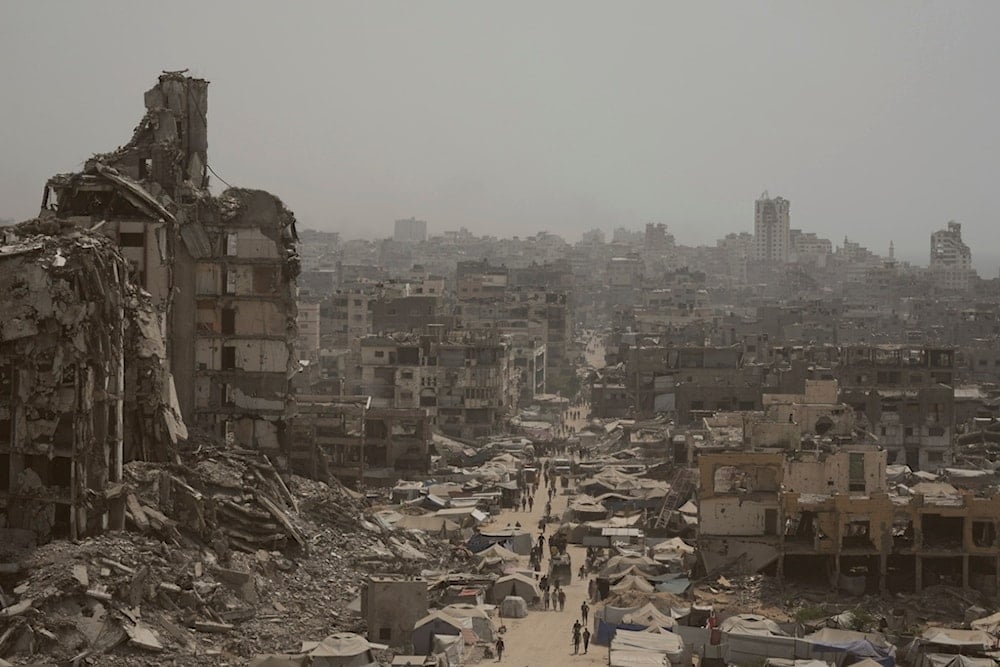UK to recognize Palestine in September if Gaza genocide continues
A statement from Prime Minister Keir Starmer's office warned that the UK's recognition of Palestine will come ahead of the UN General Assembly should "Israel" fail to act.
-

People walk along a street lined with destroyed buildings following Israeli bombardments in the Gaza Strip, Tuesday, July 29, 2025 (AP Photo/Jehad Alshrafi)
The British government announced Tuesday that it will formally recognize the State of Palestine in September if "Israel" fails to halt its ongoing genocide in Gaza and refuses to commit to a long-term peace process. The statement, framed as a moral pivot in UK foreign policy, has been met with both optimism and sharp scrutiny, given Britain's longstanding complicity in enabling the very atrocities it now condemns.
A statement from Prime Minister Keir Starmer's office warned that the UK's recognition of Palestine will come ahead of the UN General Assembly should "Israel" fail to act. “We are determined to protect the viability of the two-state solution, and so we will recognise the state of Palestine in September before UNGA unless the Israeli government takes substantive steps to end the appalling situation in Gaza and commits to a long-term sustainable peace...” it read.
Complicity Exposed
The "appalling situation" referenced in the statement refers to the catastrophic humanitarian disaster created by "Israel's" unrelenting assault and siege on Gaza, a campaign that has killed tens of thousands of Palestinians, displaced millions, and shattered nearly all civilian infrastructure. UN experts and international human rights groups have labeled "Israel's" actions as ethnic cleansing and genocide, citing the deliberate targeting of homes, hospitals, media workers, and humanitarian corridors.
Yet the UK's rhetorical shift stands in sharp contrast to its material role in the very campaign it now decries. Since late 2023, British Royal Air Force (RAF) surveillance aircraft have conducted over 500 reconnaissance missions over Gaza, gathering data that experts believe was shared with "Israel" for targeting purposes. Additionally, Israeli warplanes have been cleared to land at UK bases such as RAF Akrotiri in Cyprus, directly supporting "Israel's" bombing operations. Despite a partial suspension of arms export licenses, the UK has continued to supply key components used in "Israel's" F-35 fighter jets, aircraft linked to some of the deadliest strikes in Gaza.
Read more: UK-made F-35 parts linked to Gaza al-Mawasi tent massacre one year ago
Hypocritical Alliance
This dual role, condemning "Israel's" brutality while enabling it militarily, exposes the deep hypocrisy at the heart of British foreign policy. Critics argue that the UK's pledge to recognize Palestine rings hollow as long as it maintains operational and logistical support for Israeli forces.
Nevertheless, the announcement places London in step with Paris, which last week pledged to recognize Palestine at the UN in September unless "Israel" ends its campaign. The coordinated European pressure marks a growing break from decades of shielding "Israel" from international consequences.
The UK's announcement also reflects rising pressure at home. More than 220 British MPs across party lines have called for immediate recognition, and the Scottish National Party has threatened to table legislation if the government fails to act. Civil society organizations and legal experts continue to demand that Britain not only recognize Palestine but also end its material support for war crimes.
Performative Justice
If implemented, the UK's recognition would mark a rare moment of accountability by a permanent member of the UN Security Council. But unless Britain also dismantles the infrastructure of complicity, ending arms exports, surveillance coordination, and logistical support, its moral posture will remain performative.
As "Israel's" genocidal campaign continues, recognition of Palestine is not merely a diplomatic step, it is a bare minimum. True justice demands more: an end to colonial occupation, reparations for decades of displacement and suffering, and legal accountability for every state, Britain included, that enabled the slaughter.

 4 Min Read
4 Min Read









